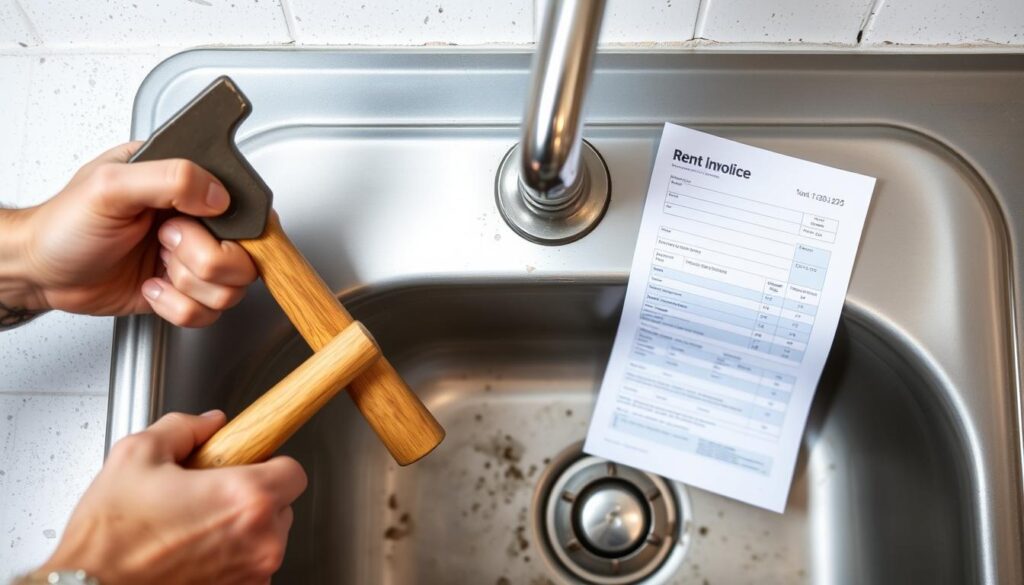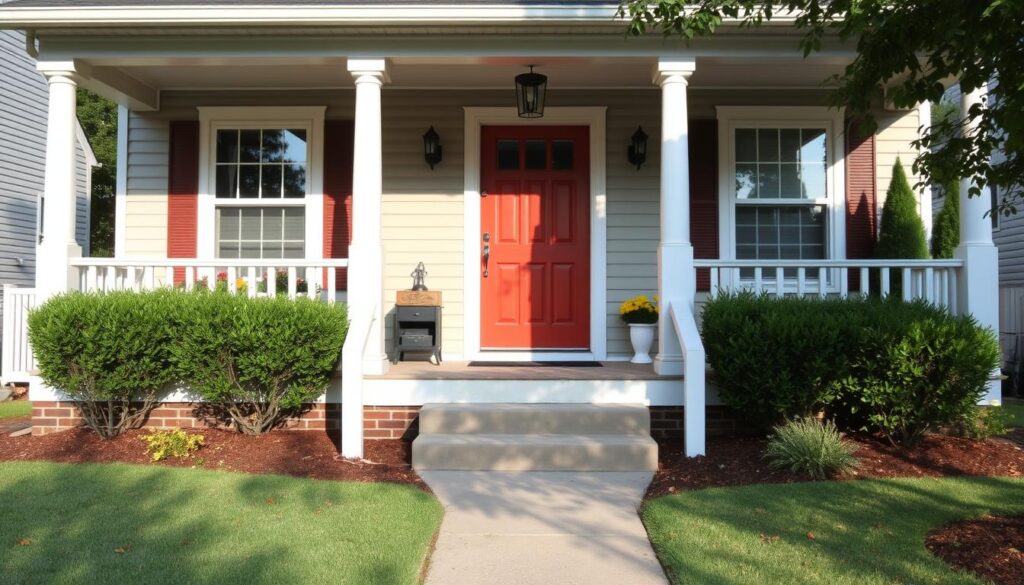If you live in New Jersey, knowing your rights and duties with rental homes is key. With about 36.65% of people renting1, it’s vital that lease deals follow local and state laws. This keeps the landlord-tenant relationship strong. Issues like tenant-deducted repairs often cause disagreements if not dealt with right.
In New Jersey, tenants can take repair costs from their rent if the landlord doesn’t fix big problems like broken heaters or toilets2. But, this process is tricky, and you must be careful to avoid legal trouble. Also, landlords must give safe and fair housing to avoid tenant deducting repairs from rent, and not fixing repair requests can lead tenants to not pay rent, take repair costs from rent, or get legal help1.
Key Takeaways
- About 36.65% of New Jersey’s people rent homes, showing why knowing landlord-tenant laws is crucial.
- In New Jersey, tenants can take repair costs from their rent if the landlord doesn’t fix big problems.
- New Jersey landlords must give safe and fair housing, and not doing repairs can lead to legal action.
- Security deposits in New Jersey can’t be more than one and a half months’ rent, with certain rules for taking money back.
- Termination notices in New Jersey depend on the lease type, with clear rules for weekly, monthly, and yearly leases.
Understanding New Jersey Landlord-Tenant Laws
If you live in New Jersey, knowing the landlord-tenant laws is key. These rules help make sure both landlords and tenants know their rights and duties. This makes renting fair for everyone3.
What is the New Jersey Landlord-Tenant Rental Law?
The New Jersey Landlord-Tenant Rental Law sets rules for landlords and tenants. It talks about things like security deposits, rent hikes, and keeping the property safe3. Landlords don’t need a rental license but must register or get a certificate3.
What Does a Rental Agreement in NJ Have to Include?
In New Jersey, you can have either oral or written rental agreements. But if it’s for more than 12 months, you must have a written lease3. These leases cover things like rent, security deposits, and what both sides must do3.
| Rental Agreement Requirement | Details |
|---|---|
| Security Deposit | The most a New Jersey landlord can ask for a security deposit is one-and-a-half month’s rent3. |
| Rent Increases | Landlords can set any rent and raise it, as long as it’s not during a lease3. |
| Late Fees | New Jersey landlords can charge any late fees for rent3. |
| Tenant Remedies | Tenants can hold back rent if the place isn’t safe to live in3. |
| Security Deposit Return | Landlords must give back tenants’ security deposits within 30 days after the lease ends, unless there’s a good reason3. |
| Landlord Entry | Landlords can enter the property with one day’s notice for checks, repairs, or showing it to others3. |
| Repair and Deduct | If landlords don’t fix things fast, tenants can sue or use the “repair and deduct” rule3. |
| Eviction Notices | Eviction notices in New Jersey depend on why you’re being evicted. You get 30 days for not paying rent, warnings for lease issues, and 3 days for breaking the rules or damaging the property3. |
Knowing New Jersey’s landlord-tenant laws helps both landlords and tenants have a smooth rental experience4.
Is New Jersey a Landlord-Friendly State?
New Jersey isn’t really a place where landlords get the upper hand. It has strong rent control and protects tenants a lot5. Landlords can enter a rental in an emergency without asking, but they must give tenants a lot of notice before ending a lease or evicting them5. The state also makes sure landlords keep homes safe and healthy for renters5.
But, New Jersey’s laws also help landlords a bit6. They can raise rent with a 30-day notice for month-to-month leases and 90 days for yearly leases. They can also charge a security deposit up to one and a half months’ rent. When tenants leave, landlords must return the deposit and any interest within 30 days6.
New Jersey’s laws mostly protect tenants more than landlords6. Over 100 cities and towns have rent control, and there are limits on how much rent can go up and how evictions work6. But, landlords still have their own rights and duties under the law7.
In the end, New Jersey isn’t the best place for landlords. But knowing the laws and rules can help landlords manage their rental properties better567.
Landlord Rights and Responsibilities
In New Jersey, landlords have certain rights and duties. Knowing these can help you manage your rental well and keep a good relationship with tenants8.
Rights
You can collect rent when it’s due in New Jersey9. You can also use the security deposit for damages that go beyond normal wear and tear9. If a tenant doesn’t pay rent or breaks the lease, you can start eviction steps as the law says8.
Responsibilities
You must give your tenants a safe and healthy place to live9. This means fixing any repairs quickly when tenants ask9. If you don’t fix things fast, tenants can take steps like not paying rent, deducting repair costs, or going to court9.
You also must follow fair housing laws and can’t discriminate against tenants for things like their race or religion9. You must make sure tenants with disabilities have equal access to your property9.
To manage your rental well and keep a good relationship with tenants, know your rights and duties in New Jersey. By doing your part as a landlord, you make a safe and comfy place for tenants. This also helps protect your investment89.
Tenant Rights and Responsibilities
In New Jersey, you have the right to find a home without facing discrimination with rental property maintenance. You also have the right to live in a place that is safe and well-kept. If your home needs repairs, you can ask your landlord to fix them. If they don’t, you can stop paying rent until they do10.
Your job as a tenant is similar to others in the state. You must keep the utilities and fixtures working well. You should pay rent on time and keep the place quiet for others. You also need to fix small issues yourself11.
Your landlord must make sure your home is safe and in good shape as they take security deposit deductions. But, you also have a part to play in keeping the property nice. By doing your part, you can get along better with your landlord and avoid legal problems11.
“As a tenant, it’s important to understand your rights and responsibilities to ensure a smooth rental experience.”
| Tenant Rights | Tenant Responsibilities |
|---|---|
| No discrimination in housing | Maintain utilities and fixtures |
| Habitable living conditions | Pay rent on time |
| Timely repair requests | Provide a quiet environment |
| Rent withholding for unrepaired issues | Make small repairs if needed |
Knowing and doing your job as a tenant in New Jersey helps you have a good rental experience. It also helps you and your landlord get along better1011.
Rent Payments and Security Deposits in New Jersey
Rent Payments in New Jersey
In New Jersey, landlords can set rent prices as they see fit since there’s no state limit12. But, local areas can set rent control. If rent control applies, landlords must give 30 days’ notice before raising rent12. They can also charge extra for late payments or bounced checks. Seniors in New Jersey get a grace period, so they’re not charged fees until five business days late.
Security Deposits in New Jersey
Security deposits in New Jersey are taken as a safety measure1213. The deposit can’t be more than one and a half months’ rent, unless it’s for a small rental1213. Tenants have the right to get their deposit back within 30 days after leaving13. The landlord can keep the deposit for unpaid rent, utility bills, lease breaches, or excessive damage.
- Landlords with 10 or more units must put security deposits in a special bank account12.
- They can’t keep interest on security deposits for admin costs; it must go back to the tenant12.
- Within 30 days of getting the deposit, landlords must give tenants a detailed statement about the deposit’s location and interest rates12.
- After the lease ends, landlords have 30 days to return the deposit and any interest, minus fees12.
- If landlords don’t return the deposit on time, tenants can sue and might get double the deposit plus legal costs12.
- When a property changes hands, the deposit rules must be passed on to the new owner12.
“Landlords in New Jersey are limited to requiring security deposits not exceeding one and a half times the monthly rental payment, and any increase in yearly security deposit beyond the initial amount may not surpass 10% of the current security deposit.”12
tenant deducting repairs from rent
If you live in New Jersey and your landlord doesn’t keep the place safe and clean, you might fix it yourself. You can use the “repair and deduct” rule to pay for repairs and then take that money from your rent14.
This way, you can fix things yourself and then lower your rent by the cost. But, there are limits. In New Jersey, you can only deduct up to one month’s rent for repairs15. Also, you can only use this method twice in a year14.
Another thing you can do is not pay rent until your landlord fixes big problems like no heat or water. This is called “rent withholding” or “rent abatement”15.
If the place is really bad and not safe to live in, you might be able to move out without breaking your lease. This is called “constructive eviction”16.
Understanding your rights as a tenant in New Jersey can be hard. So, it’s good to know the laws and get help if you need it. Knowing your options helps you fix problems and keep your home safe and nice14.

Always keep records of any problems and talk to your landlord in a polite way before taking big steps. Working together, you and your landlord can solve the issue and keep the lease okay15.
“Tenants have the right to live in a safe and habitable home, and landlords have the responsibility to ensure their properties meet those standards. When that balance is disrupted, tenants have legal recourse to assert their rights.”
The laws in New Jersey help tenants and make landlords do their job. By knowing your rights, you can fix problems and make sure your home is safe16.
Lease Termination and Eviction in New Jersey
Lease Termination Clauses in New Jersey
Tenants in New Jersey can end their lease if they want. But, they must give the right amount of notice. This notice depends on the lease type – seven days for weekly, 30 days for monthly, and 90 days for yearly leases17.
Tenants can leave early for good reasons like landlord trouble, domestic violence, health issues, bad living conditions, or military duty. But, they might still owe rent for the rest of the lease.
Eviction Clauses in New Jersey
Landlords in New Jersey can send an eviction notice for lease breaches, unpaid rent, crime, or bad behavior17. If tenants did something illegal, landlords must give a three-day notice to leave17.
New Jersey laws say landlords can’t evict tenants for revenge or unfair reasons. It’s hard for tenants to defend themselves in court without a lawyer18. A 2013 law lets tenants ask the landlord to pay their lawyer fees in some cases18.
Landlords in New Jersey must register some info with the local clerk and the New Jersey Department of Community Affairs for properties with three or more apartments18. Not registering can stop a landlord from evicting a tenant. The tenant can file a complaint and get fines up to $500 for not following the law18.
Wrong or missing notices can stop an eviction case. Landlords must follow the law when giving notices18. Public housing residents in New Jersey get special notices before their lease is ended, like a 14-day notice for unpaid rent18.
“In New Jersey, any attempt at eviction without involving Special Civil Part officers is considered illegal.”17
Other Landlord-Tenant Laws in New Jersey
In New Jersey, knowing your rights as a tenant is key. You need to understand what your landlord can do and what they must tell you. For example, landlords must tell you they’re coming over before they enter, usually 24 to 48 hours ahead of time19. But, if it’s an emergency like a gas leak, they can come in right away.
Landlord’s Right to Entry
If your landlord shows up without telling you and you don’t let them in, you’re right. The law says tenants have the right to privacy19. Landlords must always ask permission before coming in, unless it’s an emergency.
Housing Discrimination Policies
New Jersey has laws that stop landlords from treating people unfairly. These laws are like the federal Fair Housing Act20. Landlords can’t pick who they rent to based on things like race or gender. They also can’t make different rules for different people.
Mandatory Disclosures
Landlords in New Jersey must tell tenants certain things. For example, if a building has lead paint, they have to warn you20. They also have to give you a Truth in Renting statement that explains your rights.
Knowing these laws helps you protect your rights as a tenant. It makes renting in New Jersey smoother1920.
“As a tenant, it’s essential to be informed about your rights and the laws that govern the landlord-tenant relationship in New Jersey.”
| Landlord-Tenant Law | Description |
|---|---|
| Landlord’s Right to Entry | Landlords must provide reasonable notice (24-48 hours) before entering the rental property, except in emergencies. |
| Housing Discrimination Policies | Landlords are prohibited from discriminating against tenants based on race, color, national origin, sex, gender identity, or familial status. |
| Mandatory Disclosures | Landlords must notify tenants of lead-based paint hazards and provide a Truth in Renting statement. |
Conclusion
In New Jersey, knowing your rights and duties as a tenant is key21. You can deduct repair costs from rent, but do it right to avoid legal trouble21. Working well with landlords and fixing problems fast keeps the rental positive and safe21.
Landlords must keep homes safe and fix things quickly22. They should check the place before you move in, use security deposits right, and have clear lease rules22. This helps avoid problems with tenants. Both landlords and tenants in New Jersey can live together well by knowing their roles23.
Knowing about tenant rights, landlord obligations, and New Jersey landlord-tenant law is key for everyone212223. This knowledge helps landlords and tenants get along and live in safe, comfy homes.
FAQ
What is the New Jersey Landlord-Tenant Rental Law?
What does a rental agreement in New Jersey have to include?
Is New Jersey a landlord-friendly state?
What are the rights and responsibilities of landlords in New Jersey?
What are the rights and responsibilities of tenants in New Jersey?
How are rent payments and security deposits handled in New Jersey?
What remedies do tenants have if the landlord fails to maintain habitability?
What are the lease termination and eviction clauses in New Jersey?
What other landlord-tenant laws exist in New Jersey?
Source Links
- New Jersey Landlord Tenant Rental Laws & Rights for 2024 – https://www.doorloop.com/laws/new-jersey-landlord-tenant-rights
- Repair and Deduct Laws in New Jersey | Caretaker – https://caretaker.com/learn/habitability/repair-and-deduct-laws-in-new-jersey
- Rights, Regulations, and Landlord Tenant Laws – New Jersey [2023] – Azibo – https://www.azibo.com/blog/landlord-tenant-laws-new-jersey
- New Jersey Rental Laws – An Overview of Landlord Tenant Rights – https://loneeaglemanagement.com/new-jersey-landlord-tenant-law
- New Jersey Landlord Tenant Laws – https://rentredi.com/blog/new-jersey-landlord-tenant-laws/
- NJ Landlord Tenant Laws: What Rights Do You Have? – https://honeycombinsurance.com/insurance-learning-center/landlord-tenant-law-new-jersey/
- Frequently Asked Question About Landlord / Tenant Issues – https://www.hobokenattorney.com/what-we-do/landlord-tenant-law/frequently-asked-question-about-landlord-tenant-issues/
- Landlord Rights and Responsibilities | Michigan Legal Help – https://michiganlegalhelp.org/resources/housing/landlord-rights-and-responsibilities
- Tenant Rights and Responsibilities | Michigan Legal Help – https://michiganlegalhelp.org/resources/housing/tenant-rights-and-responsibilities
- Landlord’s failure to carry out duties—Repairs effected by tenant—Procedure—Deduction of cost from rent—Limitations. – https://apps.leg.wa.gov/rcw/default.aspx?cite=59.18.100
- PALawHELP.org – Your Online Guide to Legal Information and Legal Services in Pennsylvania – https://www.palawhelp.org/resource/deduct-repair-tenants-right-to-a-safe-and-dec
- Microsoft Word – Security Deposit Bulletin.doc – https://www.nj.gov/dca/divisions/codes/publications/pdf_lti/secty_deposit_bulletin.pdf
- New Jersey Security Deposit Laws – https://loneeaglemanagement.com/new-jersey-security-deposit-law
- When Can A Tenant in California Repair And Deduct? – https://michaelfatelaw.com/articles/when-can-a-tenant-in-california-repair-and-deduct/
- Repair & Deduct, and Withhold Rent: Tenant Rights in California – https://www.tobenerlaw.com/repair-deduct/
- Did You Know How California’s Repair and Deduct Rule Works to Safeguard Tenants? – Kendall Law – https://www.kendalllaw.net/kendall-law-repair-and-deduct-california/
- Landlord/Tenant | NJ Courts – https://www.njcourts.gov/self-help/landlord-tenant
- No title found – https://www.lsnjlaw.org/legal-topics/housing/landlord-tenant/evictions/pages/defenses-to-eviction-aspx
- Repair & Deduct and Rent Withholding — When Are These Unjustified? – https://www.lawgapc.com/blog/repair-deduct-and-rent-withholding-when-are-these-unjustified/
- New Jersey Landlord Tenant Rental Laws & Rights 2024 – Innago – https://innago.com/new-jersey-landlord-tenant-laws/
- When Is A Tenant Justified In Withholding Rent? – Landlord Studio – https://www.landlordstudio.com/blog/when-is-a-tenant-justified-in-withholding-rent
- When and How Can Landlords Make Tenants Pay for Repairs? – https://www.baymgmtgroup.com/blog/landlord-tenant-repair-responsibility/
- Who Pays for Repairs: Landlord or Tenant? | 33 Realty – https://33realty.com/blog/who-pays-for-repairs-landlord-or-tenant





